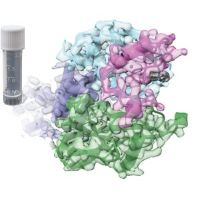Specification
| Organism | Homo sapiens (Human) |
| Expression Host | E.coli |
| Tag Info | N-terminal 6xHis-GST-tagged |
| Purity | Greater than 85% by SDS-PAGE |
| Uniprot ID | P01275 |
| Gene Names | GCG |
| Alternative Names | Incretin hormone |
| Expression Region | Partial(53-89aa ) |
| Molecular Weight | 34.4 kDa |
| Protein Sequence | HSQGTFTSDYSKYLDSRRAQDFVQWLMNTKRNRNNIA |
| Form | Liquid or Lyophilization |
| Buffer | The default storage buffer is Tris/PBS-based buffer, 5%-50% glycerol if the delivery form is liquid. The lyophilization buffer is Tris/PBS-based buffer, 6% Trehalose, pH 8.0 if the delivery form is lyophilized powder. Please contact us if you have any special requirment. |
| Reconstitution | Please reconstitute protein in deionized sterile water and we recommend that briefly centrifuge thevial prior to opening the vial .We recommend aliquot for long-term storage at -20℃/-80℃. |
Background
| Relevance | Glucagon plays a key role in glucose metabolism and homeostasis. Regulates blood glucose by increasing gluconeogenesis and decreasing glycolysis. A counterregulatory hormone of insulin, raises plasma glucose levels in response to insulin-induced hypoglycemia. Plays an important role in initiating and maintaining hyperglycemic conditions in diabetes. GLP-1 is a potent stimulator of glucose-dependent insulin release. Play important roles on gastric motility and the suppression of plasma glucagon levels. May be involved in the suppression of satiety and stimulation of glucose disposal in peripheral tissues, independent of the actions of insulin. Have growth-promoting activities on intestinal epithelium. May also regulate the hypothalamic pituitary axis (HPA) via effects on LH, TSH, CRH, oxytocin, and vasopressin secretion. Increases islet mass through stimulation of islet neogenesis and pancreatic beta cell proliferation. Inhibits beta cell apoptosis. GLP-2 stimulates intestinal growth and up-regulates villus height in the small intestine, concomitant with increased crypt cell proliferation and decreased enterocyte apoptosis. The gastrointestinal tract, from the stomach to the colon is the principal target for GLP-2 action. Plays a key role in nutrient homeostasis, enhancing nutrient assimilation through enhanced gastrointestinal function, as well as increasing nutrient disposal. Stimulates intestinal glucose transport and decreases mucosal permeability. Oxyntomodulin significantly reduces food intake. Inhibits gastric emptying in humans. Suppression of gastric emptying may lead to increased gastric distension, which may contribute to satiety by causing a sensation of fullness. Glicentin may modulate gastric acid secretion and the gastro-pyloro-duodenal activity. May play an important role in intestinal mucosal growth in the early period of life. |
| Involvement in Disease | |
| Subcellular Location | Secreted |
| Protein Families | Glucagon family |
| Tissue Specificity | GCG |
QC Data
| Note | Please contact us for QC Data |
| Product Image (Reference Only) |  |

